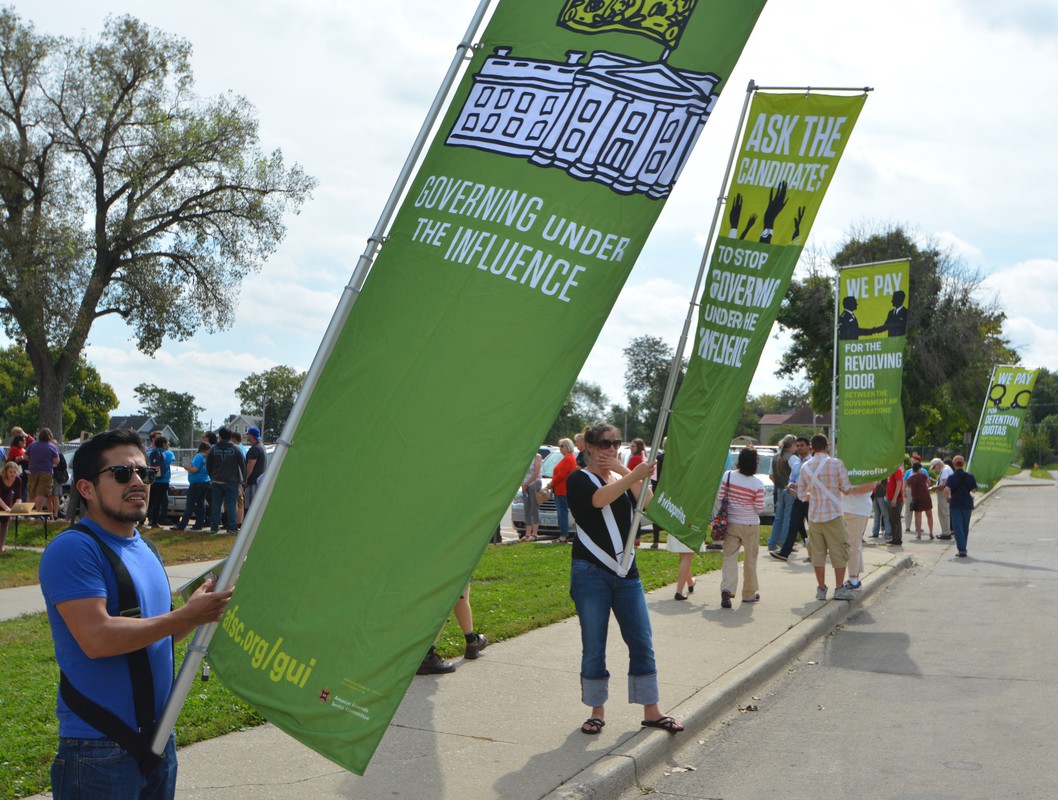
AFSC's Hector Salamanca Arroyo on the presidential campaign trail in Iowa. Jon Krieg / AFSC
At an event for a presidential candidate last summer, I had the opportunity to talk with Iowa U.S. Rep. Steve King. Even if you’re not an Iowan like me, you may have heard some of the comments he’s made about undocumented immigrants—comparing them to dogs, calling one person “a deportable,” and insisting that many were drug smugglers with “calves the size of cantaloupes.”
When I met Rep. King, I told him about my family here in Des Moines. I told him we had emigrated from Mexico when I was 2 years old for a better life. And that my parents had worked hard to support us while contributing to the community.
None of that seemed to faze him. We were here “illegally,” as far as Rep. King was concerned, and had no right to be in the United States, even though, as a child, I had had no choice in the matter.
I’ve had several encounters like these during my time as grassroots engagement coordinator with AFSC’s Governing Under the Influence project. In the year leading up to the earliest presidential primary contests, I worked with young people, particularly Latinos and other people of color, and encouraged them to question candidates about excessive corporate influence on public policy, including immigration.
When I started, I knew I would meet those who didn’t see eye to eye with me. But I wasn’t prepared for the xenophobia and fear that candidates would stir up through rhetoric aimed at immigrants like me.
People ask me how I keep my composure in such hostile situations. Why I don’t get upset or cause a scene that would draw more public attention to such hateful speech.
In these situations, I stay calm. I remind myself how important it is to engage with all people, including those who strongly disagree with me. I remind myself of the power of education to change hearts and minds. And I remind myself that I can’t begin to educate people if I walk away. Or act in a manner that makes them push me away.
These people aren’t my enemies. They’re people who, through their own life experiences, have developed stereotypes and misconceptions that haven’t been corrected. I think about what might have happened in this person’s life that made them afraid of people like me. I recognize that they’re probably generations removed from the immigrant process, that they don’t understand the difficulties we face just living our lives.
I think of these things because I want to understand where people are coming from. If I don’t, I’m guilty of dehumanizing them as much as they’ve dehumanized me.
Sharing my personal narrative is the most powerful tool I have against statements like, “You shouldn’t be here.” My mother came to the U.S. with a law degree not knowing she’d have to work as a housekeeper. Being undocumented meant I couldn’t get a driver’s license, vote in elections, or qualify for financial aid for school. But I graduated from college, with honors, and am now making a life for myself the way my parents hoped I would.
Even those who yell at me at rallies or town hall meetings can relate to my story. I know some people will never change their minds, but I also see signs that some people can. And I’m putting in the work—and withstanding some difficult situations—to move us all toward a place where we respect the humanity and dignity of all people.